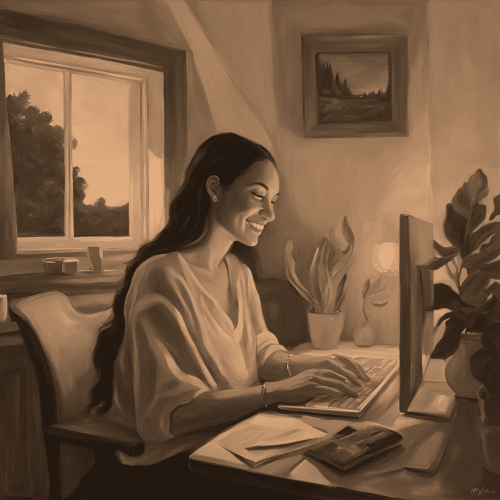When I moved from Brazil to Canada, I never imagined I would experience a profound sense of loss—not just of home, but of self. It was a mourning for a version of me that seemed to fade with each English word that replaced a Portuguese one. After thirty years of expressing myself in Portuguese, this linguistic transition felt like more than just learning new words; it was reshaping the very essence of who I was.
I then found out that academic research supports this experience. Studies suggest that bilinguals often express different emotional intensities and even self-perceptions depending on the language they’re using. One study found that switching to a second language can create a sense of distance in emotional expression, leading to a “cooler,” more reserved self-image in non-native languages (Pavlenko, 2005). This resonated with me deeply as I noticed English made me feel less spontaneous, more reserved, and perhaps less poetic. My natural expressiveness in Portuguese became a polished yet hesitant version of myself in English.
But after two years in Canada, I began recognizing glimpses of a new version of me—one that didn’t replace my Brazilian self but added layers to it. I came to realize, as other studies support, that bilinguals can construct a distinct self-identity in each language. It’s as if the languages open doors to different aspects of ourselves (Chen & Bond, 2010). The more I understood and accepted this bilingual version of myself, the more I started feeling whole again.
This adaptation wasn’t about loss anymore; it was about evolution. Working with SpotlessMind helped me recognize this journey not as a diminishment of self but as an expansion. It highlighted how our personalities can adapt and grow through changing circumstances, particularly in the context of language.
This understanding became transformative. Accepting my bilingual self—with its occasional word-searching pauses—allowed me to embrace a more complex version of who I am. In professional settings, this awareness has been particularly valuable. When I struggle to find the perfect phrase or when my expression doesn’t quite capture what I mean, I’ve learned to be patient with myself, understanding that these moments are part of the rich tapestry of bilingual existence.
The power of this self-knowledge is what we strive to bring to others through our work at SpotlessMind. Just as understanding my linguistic journey led to greater self-acceptance, we believe that helping people understand themselves and their workplace dynamics can be equally transformative. After all, isn’t the ability to adapt and grow across languages, personalities, and cultures one of humanity’s most remarkable traits?
Being bilingual isn’t just about speaking two languages—it’s about experiencing the world through two distinct lenses, each offering its own unique perspective. And while my Brazilian self hasn’t disappeared, she’s been joined by a new version who sees the world through different eyes. Whether in work or life, embracing who we are opens doors to deeper understanding and connection, both with ourselves and others.







